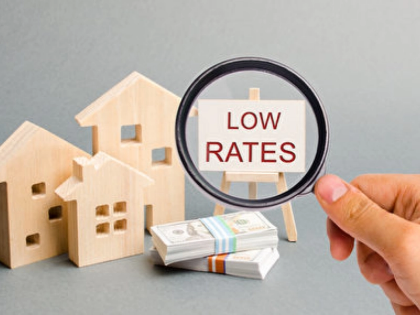Lenders usually consider income and credit scores when determining eligibility for a jumbo mortgage. Additionally, they demand documentation of cash reserves or liquid assets.
Increased Interest Rates

Because jumbo mortgages aren't backed by the government, lenders are taking on greater risk when funding them. You should thus anticipate interest rates that are more than those of traditional loans.
You can also be asked to have cash reserves in the bank and will have to make a greater down payment up front. In the event of a financial catastrophe or job loss, the lender wants to make sure you have enough money set up for up to a year's worth of mortgage payments.
For a jumbo loan, lenders usually want to see that you have outstanding income and a high credit score. They will also examine your debt-to-income (DTI) ratio to make sure you have enough money to pay off your other bills and your mortgage each month. Your lender may have requirements for a DTI ratio below 43%. This criteria is more stringent than what many traditional lenders would prefer to see. It could be necessary for you to submit balance statements, tax reports, and other supporting documents with your application.
Increased Final Expenses

Lenders usually require higher incomes to qualify for jumbo mortgages because they assume greater risk. Additional financial records, such as W-2s, tax returns, bank and investment statements, and balance sheets for your company, will also need to be submitted.
For you to be able to afford your monthly mortgage payments, lenders prefer to see a debt-to-income ratio of less than 43 percent. To guard against a loss, lenders may even demand a cash reserve equal to six months' worth of mortgage payments.
Jumbo loans are exempt from Fannie Mae and Freddie Mac restrictions, which means that the origination and appraisal fees will be higher. Furthermore, jumbo mortgage selling concessions are more restricted than normal loan seller concessions. For instance, the highest amount of seller-paid closing costs that you can receive is 3%. On the other hand, you can use this sum for pre-paid escrows, surveys, discount points, and loan origination fees. Property taxes and hazard insurance are examples of closing expenditures that are not eligible for seller-paid concessions.
By Hand

It is more difficult to qualify for jumbo mortgage loans than for normal mortgages since they demand larger debt-to-income ratios and credit scores. Lenders prefer to see a DTI ratio of no more than 43% and credit scores of at least 700. If you have a high debt-to-income ratio (DTI) and poor credit scores, you might want to think about taking out a piggyback loan, which is an 80-10-10 loan in which you put down 10% and take out two mortgages, one for 80% of the cost of the house and the other for 10%.
Jumbo loans function similarly to conventional mortgages and let you finance primary residences, second houses, and investment properties despite having more stringent standards than conforming mortgages. Compare rates and browse around to find the best jumbo mortgage rates. Over the term of your loan, even little variations in interest rates might total thousands of dollars. Additionally, before submitting an application, make sure you fulfil all requirements set forth by the lender.
Evaluation of a Second House

Compared to conforming mortgages, jumbo loans frequently have more stringent loan-to-value ratio standards. Only 80% of the purchase price or the property's appraised worth, whichever is lesser, will be financed by lenders.
Lenders are unable to offer jumbo mortgages to Fannie Mae and Freddie Mac, government-sponsored companies that purchase the majority of house loans in order to mitigate their risk and lower lending costs for investors, since they do not comply with the local county loan restrictions set by the FHFA. As a result, borrowers must pay more for jumbo mortgages.
A jumbo mortgage may be available to borrowers with stellar credit and steady income, particularly if their debt-to-income ratio is less than 43 percent. However, since a jumbo mortgage isn't traditional, homeowners will have to submit additional supporting documentation. Years' worth of tax returns, W-2s, bank statements, and investment statements may be included. You can get assistance from a home loan advisor in understanding what paperwork a lender needs to accept your financing. You may save time and money by preparing all of this material in advance.
Recommended Reading: An Explanation Of Balloon Mortgages: Everything You Should Know
























Nicely distilled. One-liner summary?
Clean handshake between concepts.
Encourages strategic patience.